AI Localization: Mastering Global Reach with Best Practices
In this article, we’ll explore how it functions and why it’s a game-changer compared to traditional methods.
- What is Localization & AI Localization?
- AI Localization vs. Traditional Localization
- Advantages of AI Localization
- How Does AI Localization Transform Today’s Business?
- Best Practices for Implementing AI Localization
- How do Businesses Utilize AI Localization?
- Debunking Common Misconceptions About AI Localization
- 6 Major Challenges in AI Localization
- Concerns Regarding AI translation
- Are AI Limitations Holding Localization Back?
- Bridging the Gap in the Future of AI Localization
- The OneSky Advantage
- Future-Proof Your Localization Strategy with OneSky
- Conclusion
Related Articles
- App/Mobile App Localization: The Ultimate Guide
- Localization Strategy: Everything You Need to Know
- AI Translation Software: Top 10 that Power Growth and Communication
We’ve all experimented with online translators like Google Translate or DeepL, quickly realizing they don’t always capture the nuances we need.
While quirky translations might be fun when it’s just for us, they can lead to awkward situations when dealing with customers.
Professional translators bring the expertise to ensure content resonates with new audiences, avoiding costly translation blunders.
However, these services can turn into lengthy, expensive processes.
This is where AI localization steps in to bridge the gap.
By leveraging the power of AI, localization goes beyond basic translation to address regional subtleties and cultural nuances while aligning with your specific brand voice and industry context.
Instead of simply glossing over misconceptions, let’s dive right into understanding AI localization.
What is Localization?

Localization is the process of adapting a product or content to meet the language, cultural, and other specific requirements of a target market.
It goes far beyond mere translation, encompassing a range of adaptations to ensure that the final product resonates with the intended audience.
For instance, when localizing software or applications, it’s not just about translating words but also about modifying user interfaces to suit local conventions.
This includes:
- Language Translation: Converting text from one language to another accurately.
- Cultural Adaptation: Altering examples, idioms, and phrases so that they are culturally relevant.
- Time and Locale Adjustments: Changing formats for dates, times, currencies, and measurements based on local preferences.
Why is Localization Important?
In today’s global economy, the power of localization is undeniable.
If your business wants to succeed internationally, tailoring your messaging to fit local cultures is crucial.
Here’s a compelling stat: 86% of localized campaign creatives beat their English versions in both click-through and conversion rates.
This means localized content doesn’t just engage users more—it drives them to take action.
By investing in localization, you’re not just translating words; you’re connecting with your audience on a cultural level and setting your business up for success across new markets.
Localized content can:
- Enhance User Experience: By speaking directly to customers in language and terms they understand.
- Increase Engagement: Customers are more likely to engage with products that feel familiar and relevant to their cultural context.
- Boost SEO Rankings: Localization contributes to improved search engine optimization (SEO) by using local keywords and phrases.
What is AI Localization?

AI localization represents a transformative leap beyond traditional localization techniques, directly addressing the demands of a global audience. With over 48% of internet users navigating through the web in a language other than English, the need for localization that transcends mere translation has never been more critical.
AI-powered localization leverages advanced technologies such as machine learning, natural language processing (NLP), and neural machine translation (NMT) to deliver a user experience that is culturally and linguistically tailored, achieving an authentic local feel across diverse markets.
These systems can analyze vast amounts of data quickly, translating and adapting content at a pace far superior to that of human translators.
Machine Learning and Natural Language Processing (NLP)
Machine learning algorithms enable systems to learn from data over time. When applied to localization, these algorithms can identify patterns, understand context, and make predictions about translations.
NLP, on the other hand, helps machines understand human language, making it possible for them to grasp nuances, idioms, and contextual meanings.
Through ongoing training with diverse datasets, AI localization tools become increasingly effective, learning to handle various language structures and cultural references.
Enhanced Translation Quality with AI
The quality of translation is paramount in localization, as it must maintain the nuance and intent of the original content. AI technologies, specifically neural machine translation, represent a breakthrough in this area.
Trained on extensive datasets, AI models can understand and translate complex language patterns and idioms with a higher degree of accuracy than ever before. This advancement not only improves the efficiency of localization but also significantly elevates its quality.
Thanks to AI’s continuous learning capabilities, which adapt and improve over time, high-quality, contextually accurate translations are now more achievable.
AI localization technologies are redefining the boundaries of how companies can engage with global audiences. By enhancing both the speed and quality of localization efforts, AI is setting a new standard in the industry.
This shift not only meets the growing demands for rapid and accurate localization across software and digital platforms but also ensures that companies can remain competitive and relevant in a swiftly evolving global market.
AI Localization vs. Traditional Localization

When it comes to localization, businesses have long relied on traditional methods that involve human translators and localization experts.
Take, for example, the process of localizing an iOS app for a Spanish audience.
Traditionally, this could mean enlisting skilled linguists to translate the content, ensuring it aligns with cultural norms and regional preferences. This could include adapting elements such as date and time formats, currencies, and measurements.
While this hands-on approach ensures accuracy, it can also be time-consuming and costly, often leading to inconsistencies that arise from individual translators’ interpretations.
Enter AI localization—a game-changer that utilizes technologies like machine learning and natural language processing (NLP) to streamline and optimize the localization process.
It introduces a significant technological advancement by automating these workflows. This automation not only accelerates the localization process but also enhances its accuracy and consistency.
AI systems can analyze, translate, and adapt content at a speed and efficiency that traditional methods simply cannot match. This innovation does not eliminate the need for human oversight; rather, it enhances and augments human capabilities.
Let’s break down the key differences between AI localization and traditional localization:
- Speed and Efficiency: AI dramatically accelerates the localization process by automating time-consuming tasks.
In contrast, traditional methods rely on manual labor, which can slow down project timelines. - Accuracy and Consistency: AI excels at maintaining uniform terminology across extensive content volumes.
Traditional localization can suffer from inconsistencies, particularly when multiple translators are involved, leading to variations in tone and terminology. - Cost-Effectiveness: By reducing the reliance on human intervention for routine tasks, AI localization cuts costs significantly.
Traditional localization incurs higher expenses due to the manual management of translation projects, including labor costs and project management fees. - Scalability: Advanced Translation Management Systems (TMS) that incorporate AI capabilities can effortlessly manage large-scale projects across multiple languages.
Traditional localization approaches can become cumbersome and impractical as project sizes increase, leading to potential bottlenecks. - Collaboration and Integration: AI-powered tools facilitate seamless collaboration among global teams and integrate smoothly with other software systems, streamlining workflows.
Traditional methods often involve siloed approaches that can hinder collaboration.
While traditional localization methods rely heavily on the expertise and variability of individual translators, AI localization leverages historical data and ongoing learning to enhance the quality and speed of translations over time.
This adaptability allows AI systems to refine their output based on feedback and evolving language use, ensuring that translations remain current and relevant.
In summary, AI localization provides an efficient, scalable, and cost-effective alternative to traditional localization methods, while still recognizing the indispensable role of human expertise.
The best approach combines the strengths of both—ensuring high-quality, culturally relevant content that resonates with audiences worldwide.
Advantages of AI Localization
AI localization leverages cutting-edge technology to transform the way businesses handle the translation and cultural adaptation of their content for global markets.
By integrating artificial intelligence into localization processes, companies can significantly improve efficiency, accuracy, and scalability while managing costs effectively.
Here are 3 key advantages of AI localization:
Enhanced Speed and Efficiency
AI-driven tools can translate vast amounts of content almost instantaneously, drastically reducing the time required for projects that would traditionally take much longer.
This acceleration in the translation process enables businesses to reach global markets faster, thereby decreasing time-to-market for products and services.
With AI, continuous translation and updates are also more feasible, ensuring that content remains fresh and relevant across all markets.
Improved Quality of Translations
Advanced AI technologies, such as neural machine translation (NMT) and large language models like GPT, are designed to understand and replicate human language with a high degree of nuance and accuracy.
These models provide translations that are not only quick but also of high quality from the outset, minimizing the need for extensive post-editing. This results in more natural and fluent translations that resonate better with local audiences.
Cost-effectiveness
AI localization tools streamline the translation process, eliminating the need for repeated manual efforts and significantly reducing labor costs.
By automating the bulk of the translation tasks, companies can allocate resources more efficiently, focusing on strategic activities rather than routine translations.
For smaller companies or those with tight budgets, AI localization provides a scalable solution that allows them to expand internationally without the financial strain typically associated with large-scale translation projects.
How does AI Localization Transform Today’s Businesses?
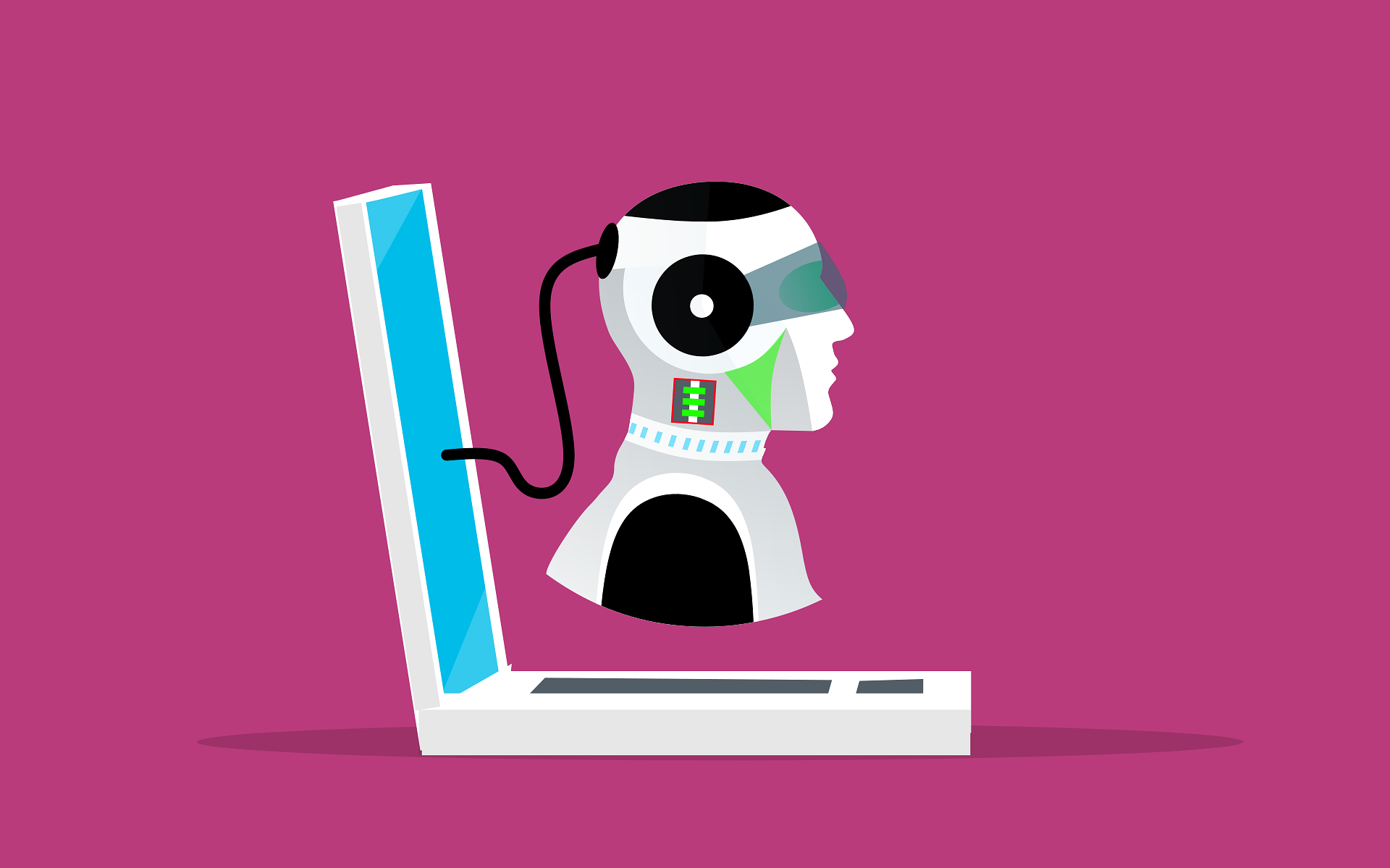
The integration of AI localization is revolutionizing how businesses operate in today’s fast-paced marketplace, delivering numerous benefits that enhance both efficiency and profitability.
Here’s a closer look at the transformative impact of AI localization on modern businesses:
Driving Revenue Growth
Many companies that have incorporated AI into their operations report significantly higher average revenue growth compared to those that do not utilize these technologies. This demonstrates a clear relationship between AI adoption and enhanced financial performance.
By enabling easier access to localized content, companies can effectively engage diverse audiences, consequently driving sales and expanding their market reach.
Boosting Profitability
Implementing AI localization can lead to a notable increase in profitability.
Businesses leveraging AI technologies tend to experience a greater enhancement in profit margins than those that do not. This improvement can be attributed to increased operational efficiency and smarter decision-making processes, allowing organizations to maximize their resources and reduce unnecessary costs.
Enhancing Productivity
The impact of AI on productivity cannot be overstated. Organizations using AI localization tools typically see significant boosts in productivity levels, far exceeding the improvements reported by companies that rely on traditional localization methods.
By streamlining processes and automating time-consuming tasks, teams can focus their efforts on more strategic initiatives, ultimately driving better results.
Improving Customer Engagement
AI localization plays a critical role in enhancing customer experiences, leading to heightened engagement and satisfaction.
By delivering tailored content that resonates with local audiences, companies can foster loyalty and deepen relationships with customers. This personalized approach has been shown to significantly improve brand perception and customer retention.
Streamlining Operations and Decision-Making
Beyond enhancing customer experiences, AI localization also streamlines operational processes. Companies that employ AI technologies benefit from greater efficiency, which translates into faster and more accurate decision-making.
By analyzing data more effectively, AI allows organizations to develop informed strategies that align with market trends and consumer behaviors.
In conclusion, AI localization is not only a catalyst for improved operations but also a driver of financial success for companies.
By implementing AI-driven solutions, businesses can optimize their localization efforts and create meaningful connections with global customers, ultimately paving the way for sustainable growth and success in an increasingly competitive environment.
Best Practices for Implementing AI Localization
To effectively harness AI localization while navigating its challenges, organizations should adopt the following best practices:
Combine AI with Human Expertise
Utilizing a hybrid model that combines AI-driven translations with human editing ensures the best of both worlds.
AI can swiftly handle large volumes of text, while skilled localization professionals can refine the output for tone and cultural relevance. This collaboration enhances both efficiency and quality.
Invest in Quality AI Tools
When it comes to achieving success in AI localization, investing in the right tools is crucial.
Organizations should carefully assess their options, prioritizing solutions that offer robust machine learning capabilities and reliable ongoing support.
This is where OneSky shines as your all-in-one solution for localization.
Our platform combines advanced AI technologies with a user-friendly interface, streamlining your localization processes and helping you achieve enhanced efficiency and cost-effectiveness.
With OneSky, you’ll benefit from a comprehensive suite of tools designed to optimize your translation quality while simplifying project management.
With the support of high-quality AI tools, organizations can confidently navigate the complexities of localization, ensuring consistent, culturally relevant messaging that resonates with global audiences.
Experience today to drive your localization efforts forward and deliver measurable results for your business!
Regularly Update AI Systems
The landscape of language and culture is constantly evolving.
Regularly updating AI localization systems with new datasets and insights helps improve the model’s performance. Organizations should create a process for gathering feedback and implementing updates, ensuring that the AI remains relevant to current trends and shifts in language usage.
Training AI Models
Providing targeted training for AI models is essential for improving their performance.
Organizations can incorporate localized content and regional language variations into their training datasets, ensuring that the AI system learns from a diverse range of examples. This comprehensive approach enhances the AI’s ability to handle various linguistic and cultural contexts.
Monitor Performance
Establishing metrics for evaluating the effectiveness of AI localization efforts is crucial.
Metrics such as user engagement, translation accuracy, and ROI can help organizations assess performance. Regularly monitoring these indicators enables businesses to identify areas needing improvement and refine their strategies accordingly.
Foster Collaboration Between Teams
Integrating localization efforts across departments fosters better understanding and communication.
Localization teams should collaborate with marketing, development, and customer support teams to ensure a unified approach to addressing user needs. This collaboration can lead to a more informed localization strategy that effectively addresses cultural nuances and regional preferences.
How do Businesses Utilize AI Localization?

As organizations increasingly embrace AI localization, several industries have already begun to reap substantial benefits.
E-commerce Platforms
E-commerce companies, such as Amazon and Alibaba, utilize AI localization to improve user experience across various markets.
By automating the translation of product descriptions, reviews, and customer service inquiries, these platforms provide personalized shopping experiences tailored to local preferences.
Moreover, AI helps optimize key elements like pricing, promotions, and payment methods for each specific market.
Mobile Applications
Mobile applications, including gaming and productivity tools, frequently leverage AI localization to reach global audiences quickly.
For example, gaming companies like Riot Games utilize AI to facilitate real-time translation of gameplay content and community interactions, ensuring players from different regions can connect and compete without language barriers.
Click here to find out more about Game Localization.
Software Development
Software companies are integrating AI localization into their development cycles to streamline updates and version releases.
Tools like OneSky allow teams to automate the translation of in-app content and documentation, reducing the time it takes for localized versions to hit the market. This accelerated process ensures that developers can respond to user feedback and market demands more promptly.
Click here to find out more about App Localization.
Publishing and Content Creation
Media companies and publishers are also harnessing AI localization for managing large volumes of content.
By using AI translation tools, they can expand their offerings to non-English speaking audiences promptly. This approach has proven beneficial for organizations like Netflix, which localizes subtitles for vast amounts of video content, ensuring viewers across the globe can enjoy movies and shows in their preferred languages.
Education and E-Learning
In the education sector, e-learning platforms are increasingly adopting AI localization to provide diverse course offerings to a global audience.
Platforms such as Coursera and Duolingo employ AI tools to translate course materials, instructional videos, and assessments, ensuring that learners from different linguistic backgrounds can access high-quality educational resources.
Debunking Common Misconceptions About AI Localization
As AI localization becomes more popular, several myths have emerged about its capabilities. Let’s set the record straight so you can fully harness the benefits of AI localization.
Myth: AI Eliminates the Need for Human Translators
Truth: While AI has advanced significantly, it hasn’t reached a point where it can fully replace human involvement.
Human translators remain crucial for ensuring translated content is culturally appropriate and relevant.
Think of AI as a powerful tool to enhance and expedite the localization process. When integrated with a robust translation management system, AI streamlines workflows, allowing seamless collaboration with stakeholders.
Myth: AI is Error-Free
Truth: AI translation tools are progressively improving but are not infallible.
They can stumble over complex linguistic nuances and idiomatic expressions, making human oversight essential for maintaining high-quality translations.
Despite AI’s advancements, a level of human involvement is needed to verify accuracy and contextual appropriateness.
Myth: AI Compromises Privacy
Truth: There’s a misconception that AI compromises data privacy due to the large volume of data it processes. However, most reputable AI translation tools prioritize data protection.
For instance, many utilize industry-standard encryption to safeguard data during transmission and storage. Such tools typically don’t store or use your data for improving models unless you explicitly opt in, ensuring your privacy is respected.
By understanding the realities behind these misconceptions, you can better leverage AI localization, combining technological efficiency with human insight for optimal results.
If you’re ready to explore AI localization possibilities, look for trusted solutions that address these concerns effectively.
6 Major Challenges in AI Localization

While the prospects of AI localization are promising, organizations must recognize and address the challenges involved to maximize its effectiveness.
1. Cultural Nuances
One of the most significant challenges in AI localization is the ability to capture cultural nuances accurately.
AI may struggle to understand local idioms, humor, and traditions, leading to translations that might be technically correct but culturally inappropriate.
For instance, a marketing campaign that works well in one market may be ineffective or even offensive in another. This gap highlights the need for human oversight in the localization process, ensuring that messages resonate with the intended audience while respecting cultural sentiments.
2. Contextual Understanding
AI localization tools can sometimes lack the ability to understand context fully.
Words and phrases may have multiple meanings depending on the situation in which they are used. If the machine fails to grasp the context, it could lead to ambiguous or misleading translations.
For example, the term “lead” can refer to a metal, a position in a project, or guiding someone, depending on the context. Organizations must ensure that AI systems are trained with sufficient context to enhance understanding and accuracy.
3. Quality Maintenance
Ensuring consistent quality in AI translations is an ongoing challenge.
As AI systems produce translations quickly, there is a risk that errors could go unchecked, leading to inaccuracies that affect brand reputation. Regular audits and updates are required to maintain a high standard of translation quality.
Organizations must implement quality checks, gather feedback, and continuously adjust their localization strategies to address potential issues.
4. Data Privacy and Security
As with any technology that involves data processing, security is paramount. Many AI localization tools require access to proprietary content, user data, or sensitive information.
Organizations must be cautious about how their data is utilized and ensure that AI service providers adhere to privacy regulations and best practices. Failure to protect sensitive data can lead to severe consequences, including data breaches and loss of customer trust.
5. Dependency on Data
AI systems rely heavily on vast datasets for training.
If organizations do not provide diverse and representative datasets, the quality and accuracy of translations may suffer. Additionally, issues may arise if the datasets include biased or dated information, resulting in culturally insensitive translations.
Organizations should ensure that they equip their AI tools with comprehensive datasets that reflect the language, culture, and current trends.
6. Integration Concerns: Compatibility with Existing Systems
Integrating AI localization tools with existing content management and localization workflows can present technical challenges.
Compatibility issues may arise, necessitating potentially significant adjustments or overhauls to current systems.
These integration concerns require careful planning and resources to address, ensuring that the benefits of AI can be fully realized without disrupting established processes.
According to Forbes, AI technologies require substantial data volumes for precise training. Typically, an application should possess data at least tenfold the quantity of its model parameters. Furthermore, this data is allocated with 80% dedicated to the training phase and 20% reserved for validation purposes, ensuring the AI’s effectiveness and accuracy.
Concerns Regarding AI translation
Transitioning to AI-powered translation presents various challenges and questions that your company needs to navigate carefully. Understanding these challenges is crucial for smooth integration and effective use of AI in localization processes.
-
Security Concerns
Considering that more than 60% of organizations experienced a jump in cyber threats since 2020, the security of AI translation tools remains a significant concern for companies dealing with sensitive and proprietary content.
The use of AI requires stringent security measures to prevent data breaches and ensure confidentiality.
-
Process Complexity
Transitioning to AI-powered translation often necessitates a comprehensive reassessment of existing localization workflows.
While AI can streamline and enhance these processes, integrating it requires careful planning and adjustment, as many companies lack in-house expertise.
-
Quality Assurance
Ensuring the accuracy and cultural relevance of AI-generated translations remains a core challenge.
Studies show that human translation quality is higher than artificial intelligence translation. While AI enhances speed and efficiency, the human element in understanding cultural nuances is crucial and must be preserved.
-
Preparation for DIY AI Translation
Setting up AI translation in-house can be daunting and complex. A Deloitte study shows that only 26% of organizations surveyed consider themselves seasoned at AI adoption, and almost half would consider themselves to be skilled. AI implementation involves not only a significant initial investment in technology but also continuous management and quality assurance, which can be technically and logistically demanding.
While AI translation offers significant potential benefits, such as cost savings and scalability, it also presents substantial challenges in terms of security, complexity, and maintaining quality. Partnering with experienced providers like OneSky can mitigate these issues, providing expertise in managing the intricacies of AI-powered translation efficiently.
Are AI Limitations Holding Localization Back?
Let’s face it—while AI has made impressive strides in localization, relying solely on it isn’t the end-all solution.
A fully automated approach has its challenges that can hinder both the quality and cultural relevance of the content we produce.
One significant hurdle is AI’s difficulty in understanding context. It often struggles with those subtle nuances, cultural references, and idiomatic expressions that breathe life into language. As a result, translations can miss their mark, failing to connect with audiences in a meaningful way.
When it comes to adapting content for different cultures, AI can also fall short.
Effective localization isn’t just about swapping out words; it’s about grasping local customs and expressions that only a human can fully appreciate. This is where human translators shine, bridging cultural divides and crafting messages that truly resonate.
And let’s talk about creativity and emotional depth. AI might be great at processing information, but it can’t conjure the emotional impact and creativity that humans bring to storytelling and branding. Thought-provoking marketing slogans and captivating narratives still need that creative spark only a person can provide.
Additionally, while AI can tackle many languages, some lesser-known languages face challenges due to limited training data. This can lead to inconsistencies and inaccuracies, requiring human intervention to polish translations and ensure they hit the right tone.
Finally, AI systems are not immune to producing unexpected errors or biases, especially when they learn from flawed data. To adapt effectively to evolving language trends and cultural shifts, these models need continuous refinement—and that’s where human expertise comes into play.
Bridging the Gap in the Future of AI Localization

As we look ahead, the future of AI localization is set to advance significantly through collaboration between AI technologies and human expertise.
This partnership is essential for creating a more effective and nuanced localization process that addresses the gaps where AI currently falls short.
We can expect a rise in collaborative workflows where AI takes on the repetitive and time-consuming tasks, allowing localization professionals to focus on the creative and culturally sensitive aspects of their work. This synergy not only boosts productivity but also ensures that the final content resonates more deeply with diverse audiences.
Real-time localization will also become increasingly important as our global market grows more interconnected.
Businesses will need to rapidly adapt their content, especially on dynamic platforms such as social media. In this context, AI technologies will play a pivotal role in enabling organizations to respond almost instantly to evolving trends and shifting consumer preferences.
Moreover, with the increasing importance of multimedia content, localizing voice and video materials will become essential. Advanced AI solutions will facilitate swift and effective subtitling and dubbing, ensuring that engaging content effectively connects with audiences in a culturally relevant manner.
The OneSky Advantage
In the realm of digital globalization, OneSky stands out as a beacon of innovation, blending the power of AI localization with the irreplaceable touch of human expertise. This unique combination ensures that your company can stay a step ahead of today’s competitive global market by achieving the following.
Your trusted guide in exploring AI maturity across languages
Boost Translation Quality
OneSky revolutionizes the localization process by integrating advanced AI technologies with the nuanced understanding of our 1,000+ professional linguists. While translation memory, glossaries, string context are applied in translation, our AI engine leverages human translators’ feedback in the adaptive machine translation process which highly increases translation quality and scalability while maintaining the brand’s voice across different cultures and languages.
OneSky embodies the perfect balance between technological efficiency and human creativity. AI-powered tools automate the tedious aspects of the localization workflow, allowing human translators to focus on aspects that require cultural sensitivity and creative interpretation. This collaborative approach ensures that translations are accurate and culturally relevant.
Boost Productivity
As the go-to translation solution for developers and SaaS companies building a global brand, OneSky also seamlessly integrates with the most popular platforms. This achieves comprehensive linguistic guidance, no matter your tech stack.
Other features, such as string management, automated workflows, on-device testing, and APIs eliminate redundancies and shorten turnaround times so you can scale efficiently.
Reduce Costs
Who doesn’t love saving money? We understand the time and cost

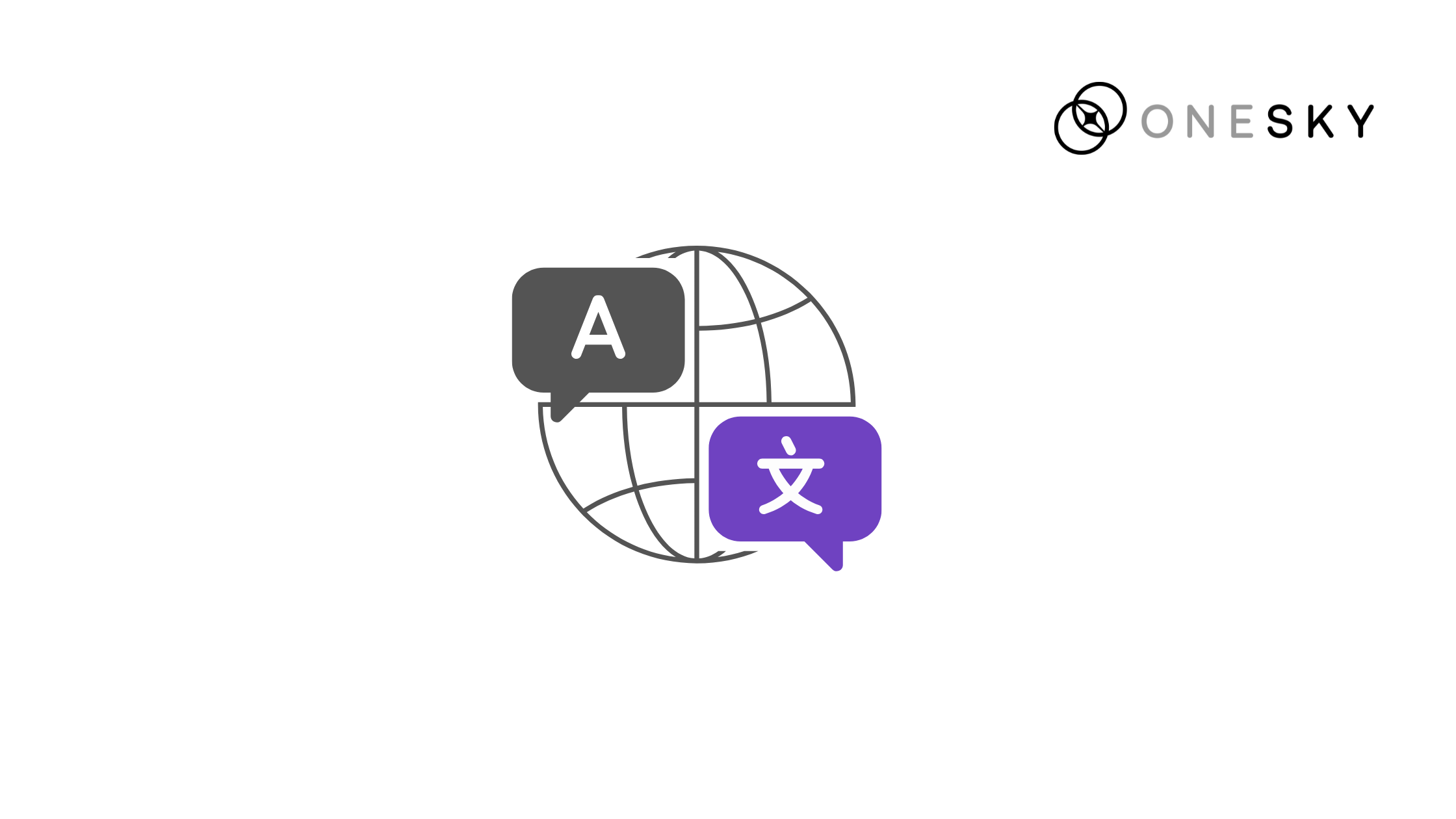

 Written by -
Written by - 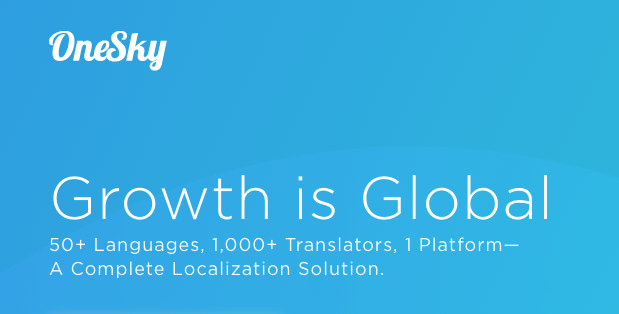

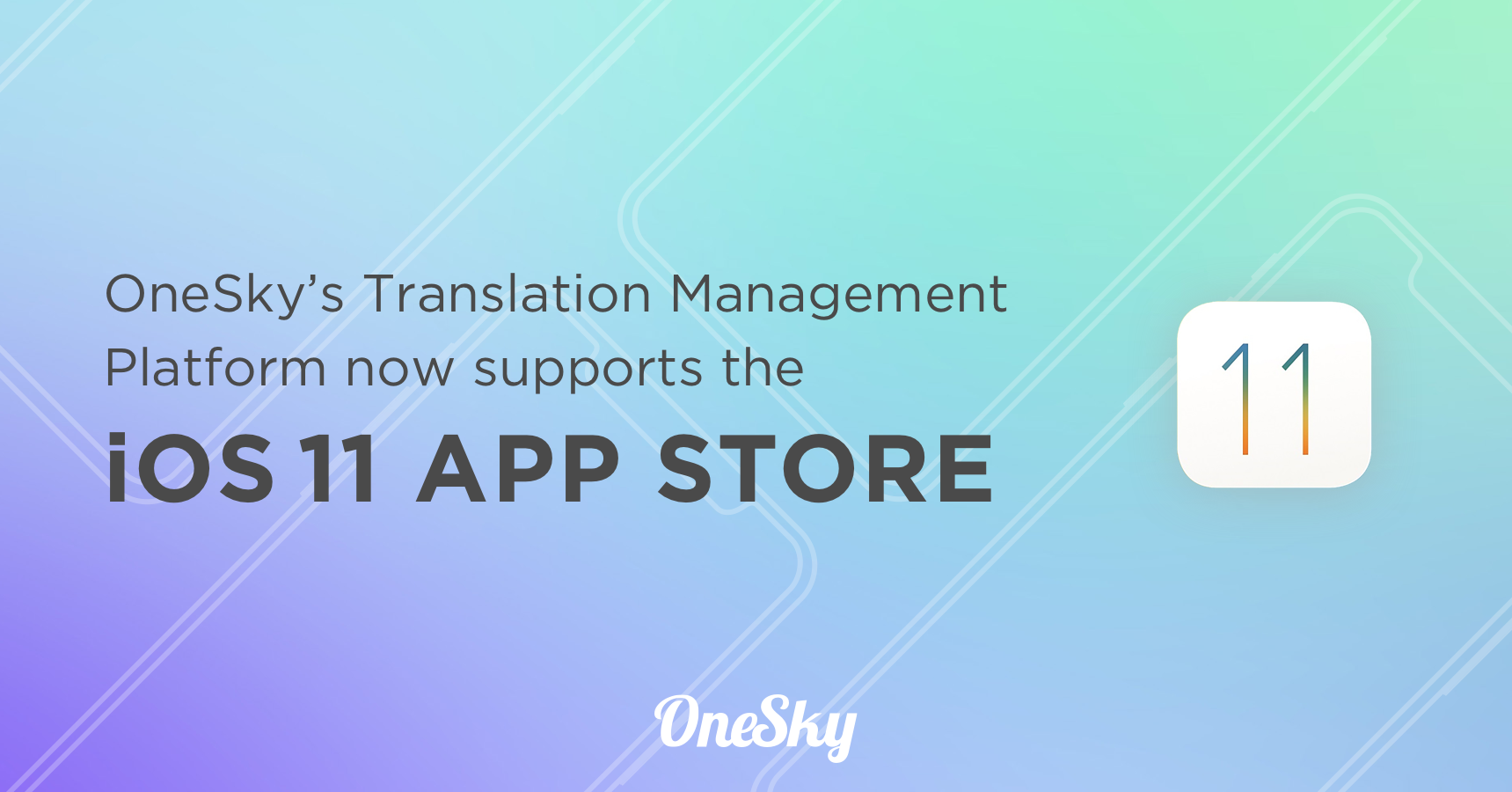
 Written by
Written by 
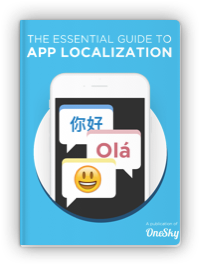
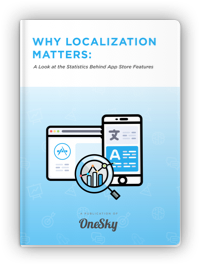
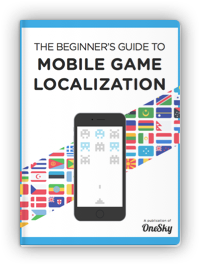
AI localization truly redefines global content strategies by blending efficiency with cultural sensitivity. For businesses looking to complement their localization with dynamic visual content, Vidful AI offers tools like AI video generation — great for creating tailored visuals that resonate across cultures!